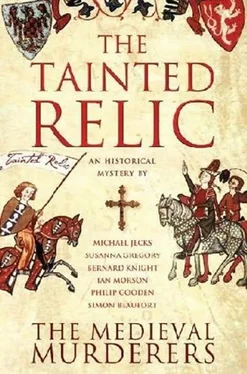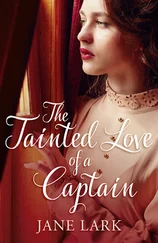What did emerge was, at first sight, disappointing. A small oblong wooden box with a hinged lid that had an inlaid pattern of a star. Hatch opened it. Without raising the box from the ground, he beckoned me to look more closely. Inside was a glass vial, a little more than a finger’s length, with a faded gilt stopper. Treating the vial as warily as he might the contents of Pandora’s box, Ulysses Hatch lifted it out and cradled it in a pudgy palm.
‘Look near,’ he said. ‘What do you see inside?’
‘I see a bit of wood.’
‘Yes, and…?’
‘Jump to it,’ said the raven.
‘The wood is grey and stained in places,’ I said, attempting to ignore the bird.
‘Just so.’
I made to reach out my hand to take the glass vial with its unremarkable contents for a closer examination, but Hatch snatched it towards him and began wrapping it up once more inside the woollen cloth.
‘You would not want to touch what’s in here, master,’ he said. ‘This is what gives Wapping Doll the goose bumps.’
What in God’s name was he talking about? I was on the point of saying that this was not the item I’d come in search of when Hatch raised a hand to silence me. He was still kneeling on the ground, and when he looked up again there was an odd mixture of fear and calculation on his sweaty face.
‘You are working for Philip Henslowe, aren’t you?’ he said.
Just as I’d earlier nodded to deny that we were with ‘Shakespeare’s lot’, so I now gave a rueful smile to indicate that he’d got this right too. I felt happier not delivering an outright lie, yet not altogether happy.
‘I knew it!’ said the bookseller. ‘That man has got his hand in plenty of plackets. Playhouses, bear pits, pick-hatches, you name it, and Philip Henslowe will be there, turning a penny. But let me tell you, Nicholas Revill, your employer should beware of this item.’
He gestured at the wooden box. Now it was his turn to read my face. What he read was confusion.
‘You don’t know what it is, do you? Old Henslowe’s sent you to purchase something without telling you what it is.’
‘No, I don’t know what it is,’ I said, ‘and that’s no more than the truth.’
‘Why, man, this object which is secure in its glass case…is a fragment of the True Cross. It is marked with the blood of Our Lord.’
At first I thought I’d misheard him or that he was joking. Then I studied Ulysses Hatch’s expression more carefully and understood that it was no jest. My eyes swam and my legs almost gave way beneath me.
Of course, like everyone, I have a glancing acquaintance with the business of relics. I’ve heard of the vial of Christ’s blood which they keep in Walsingham, and of saints’ bones that are stored elsewhere. Yet in these latter days such items are somewhat discredited as being associated with the old religion. My parson father, for example, would refer to them as popish gewgaws. He’d say that those who looked for salvation from old bones would do better to seek God’s grace directly rather than gawp at what were most likely the remains of sheep and swine. But it’s one thing to hear this from the pulpit and quite another to be confronted with such an object in the flesh, as it were.
Perhaps the bookseller didn’t believe he had done enough to convince me, for he once again unwrapped the wooden box, opened it and extracted not the glass vial but a strip of folded parchment. This he handed to me, telling me to take care.
There was some lettering on the parchment, but very faded. The skin was also so torn and frayed that I feared it might crumble in my hand. In the uncertain light of the tent I struggled to read the words but was able to make out only a handful, which appeared to be in Latin, among them sanguis and sancta . There was what looked to be a signature underneath, although I could not decipher any more than isolated letters, together with a small raised area like a scab, the remains of a seal perhaps. All this time Hold-fast the raven paid close attention to what we were doing, as if he were capable of reading better than either of us.
After a moment I returned the parchment to Hatch.
‘I have this in English,’ said the publisher and bookseller. ‘It confirms the wood in the vial to be a piece of the True Cross, rescued from the Church of the Holy Sepulchre in Jerusalem. It is signed and sealed by Geoffrey Mappestone, Knight. It is very old.’
‘How…how did you come by it?’
‘They say that a friar had it in the old days. It passed from his hands to others-and so to mine.’
He made it sound like a natural process, but I would bet a week’s wages that he had acquired it less than honestly.
‘You are willing to sell this thing?’
‘It is not to the seller’s advantage to say it, but I will be glad to be rid of this “thing”, as you call it,’ said Hatch. ‘What Master Henslowe does with it is his business, but I’ve had enough of it. Good fortune does not follow the possessor, though I did not know that until after I’d…obtained it. They say that to touch it is death.’
This might have been so much seller’s talk, perversely heightening the attraction of something by drawing attention to its dangers, but I felt the nape of my neck crawl.
‘You might give it away.’ I paused and chose my next words with care. ‘There must be many who would be glad to receive such an object.’
‘Give it away? I have a living to make, Master Revill. Why shouldn’t I turn an honest penny? No one will get their hands on this unless they have first paid me an honest price.’
And also from the trunk he produced a battered pistol. It was a rusty old gun, with a bulbous handle and a blunt muzzle.
‘I keep this primed and ready,’ said Ulysses Hatch, toying with the flint-arm. ‘The world is full of rogues.’
‘Master Hatch,’ I said, tired of this and not a little frightened by the sight of the pistol. ‘It’s time to get one or two things straight. It’s true that I have been sent here to obtain something from you but not…whatever is contained in that vial. I know nothing of any cross, true or otherwise.’
At this Hatch replaced the box inside the trunk, which he fastened with the padlock. The pistol, however, he did not replace, but positioned it carefully on top of the chest, as though he might want to use it at any moment. Everything he did, he did slowly, but I had the impression that he was taking even longer over this sequence of small actions so as to give himself time to think. I glanced at the bird on the perch. Hold-fast was now so interested in the proceedings that he was pretending to be looking in the opposite direction.
‘Then you’re not a player?’ said Hatch eventually.
‘I’m a player all right. And I’m here about playing matters. In brief, I have heard that you possess the foul papers of a play by William Shakespeare which is called Domitian . I have been commissioned to buy them off you.’
By now Ulysses Hatch had struggled to his feet. The mixture of expressions that had played across his fat features while we were discussing the relic-fear and calculation-had been replaced by a guarded look.
‘By Henslowe?’
‘I never said so, whatever you may have thought,’ I said, growing hotter and more uncomfortable, then moving rapidly on before he could rebuke me for misleading him. ‘I can offer a fair price for these foul papers of WS. William Shakespeare, I mean.’
‘Shakespeare, pah!’ He almost spat out the word. Then added, more calmly, ‘The foul papers of Domitian ? I may have what you are after. What do you mean by a fair price?’
‘Three pounds, shall we say?’
‘Let us say six pounds.’
Читать дальше












